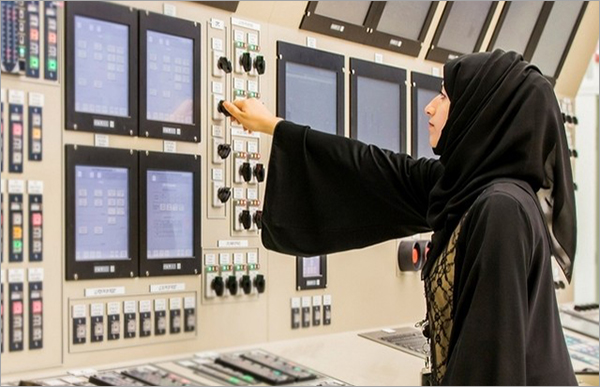Emirati Women Powering Ahead in UAE’s Nuclear Industry
Amani Al Hosani’s fascination with nuclear energy began at school learning about atoms and chain reactions in science classes.
“I loved reading about nuclear energy”, says Ms Al Hosani, who became the UAE’s first female nuclear scientist three years ago. “But I never imagined as a child that the UAE would take the lead and build the first nuclear power plant in the Arab region. I am very proud to be a part of this achievement.”
Ms Al Hosani is now deputy head of simulators at the Emirates Nuclear Energy Corporation (Enec), but her journey to this role took a twist along the way.
Her career started in the oil industry in 2009 when she became a process engineer with Abu Dhabi Company for Onshore Petroleum Operations (Adco) in its onshore oilfields. It was the same year that Enec, which specialises in the deployment, ownership and operation of nuclear power plants within the UAE, was established.
“I joined the oil industry first but things were changing – Sheikh Mohammed bin Zayed said that oil is history. That’s what made me want to go into nuclear power,” explains Ms Al Hosani.
But she isn’t the only female nuclear scientist in the country making her mark – the sector is now opening up to increasing numbers of females.
Enec says it has 1,400 employees, with more than 21 per cent of them female – higher than the global average of just over 20 per cent for females in nuclear professions worldwide. More than 29 per cent of the students in Enec’s Pioneers Scholarship Programme – which is training future nuclear energy leaders to oversee safe operations of the country’s first plant when it begins operations in 2017 – are also female. This figure increases to 34 per cent in the Higher Diploma in Nuclear Technology (HDNT) programme.
And this summer, the company celebrated the one-year anniversary of the region’s first Women in Nuclear (WiN) Chapter – the global organisation that supports the role of women in the nuclear industry around the world.
“Developing women in such an important industry that will enhance the future social and economic growth of our nation is innovative as well as necessary,” says Sheikha Lubna bint Khalid Al Qasimi, Minister of International Cooperation and Development. “Women have an important role in communicating the benefits of nuclear energy and reassuring society on the facts about health and safety.”
To gain her foothold in the industry, Ms Al Hosani, now 29, went back to higher education, completing a master’s degree in nuclear engineering at Khalifa University, under Enec’s sponsorship.
It might easily have been a very different story though – her first application to enter the programme was turned down.
“I applied a second time and when I was accepted I felt my dream was becoming a reality,” she recalls.
Another Emirati female leader at Enec is Huda Al Hashimi, recently appointed as the company’s group external affairs director to oversee development of its communications strategy.
“The women at Enec are highly skilled professional females, whether in the operations or the admin side,” she says. “We are seeing more young females pursuing careers in engineering, science and technology fields and excelling in their professions.”
Ms Al Hosani says more women entering the sector inspires her, adding that many contact her via social media to quiz her about her role. “They share their concerns with me and I tell them that it’s not as difficult as they imagine. I encourage them to come on board with us.”
She hosts training sessions and visits in the simulator training centre, which houses exact replicas of sections of the power plant, including the control room.
“There are many safety scenarios that we prepare for,” she explains. “We have to train the operators very well, as it’s important for them to know all of the more than 75 complex systems we have in the nuclear power plant. It’s essential to teach the operators to be able to communicate properly, and also to enhance their leadership skills in the simulator room. It’s a huge responsibility. But I am up to it.”
Construction of the UAE’s first nuclear energy plant continues, with Unit 1 now over 75 per cent complete and all four units more than 45 per cent complete. By 2020, Enec will need approximately 2,000 employees to operate its four nuclear plants at Barakah, with 60 per cent of these roles to be filled by Emirati women and men.
However, the nuclear plants and simulators Ms Al Hosani works on are located in Abu Dhabi’s remote Western Region – a long commute from her home in the capital. “My family understand that my job is really demanding and they support every step I take,” says the mother of three children, who is currently on maternity leave.
She adds that women don’t need to be “superwomen” to juggle a nuclear career with the demands of motherhood. “Enec understand the important role of the woman as a mother so they are very flexible,” she adds. “We are really at a critical phase in the simulator project. The second simulator has just been installed, so I am looking forward to going back to work now.”
By Jessica Hill | Published in The National | September 30, 2015
